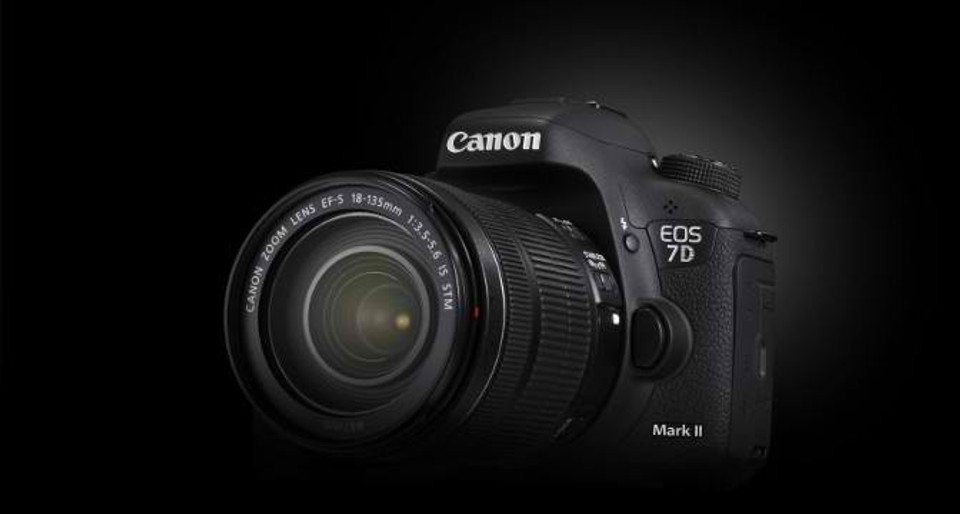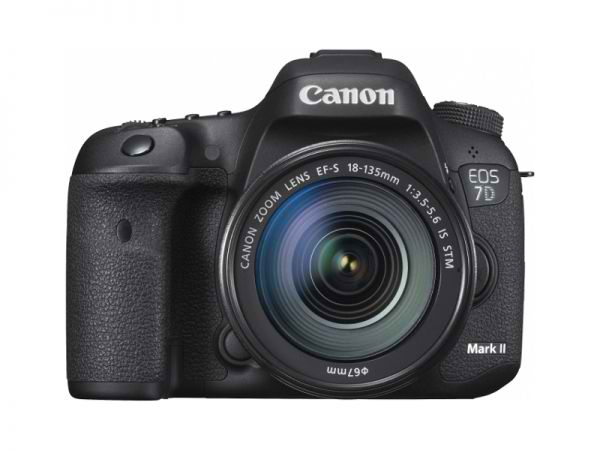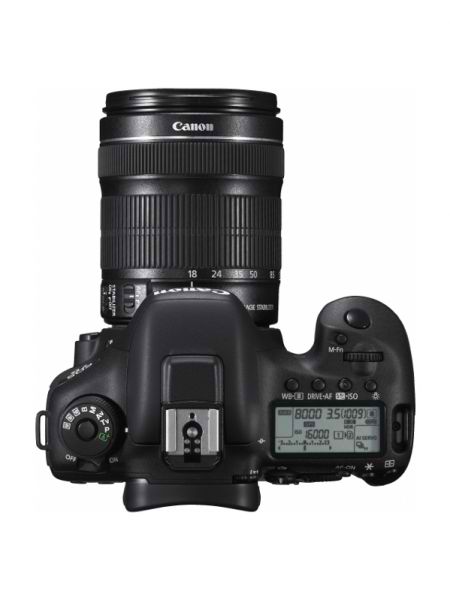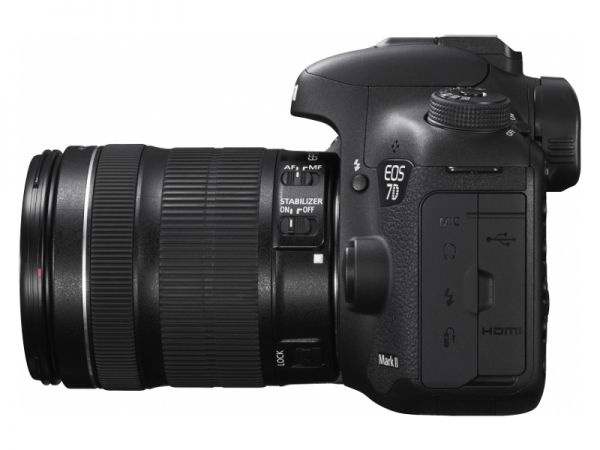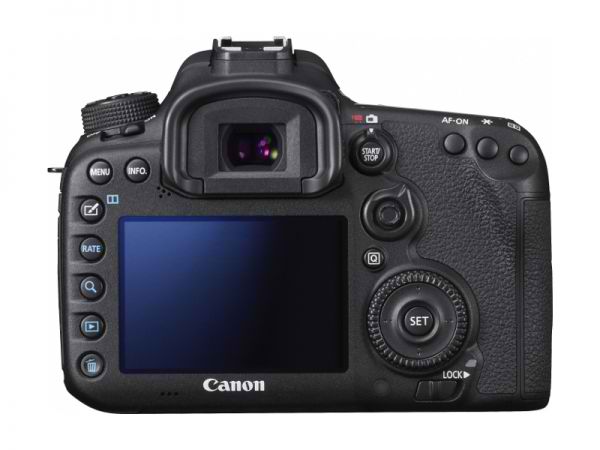New EOS 7D Mark II Camera Provides Captivating Creative Power at an Affordable Price
September 15, 2014 – Canon Canada Inc., a leader in digital imaging solutions, is proud to introduce the EOS 7D Mark II Digital SLR camera, incorporating professional features and quality in an affordable DSLR. Building upon the proven success of the EOS 7D camera, this new EOS model features a range of “EOS firsts” such as Dual DIGIC 6 Image Processors for superb image quality and rapid burst shooting up to 10 frames per second (fps), as well as Canon’s first 65-Point* All Cross Type autofocus (AF) system for compositional freedom and accurate, spot-on fast focus. Great for shooting indoor activities such as sporting events, concerts, or weddings, the camera’s impressive low-light shooting capabilities along with its up-to-10 fps high-speed shooting can capture a fast-break basketball dunk, a band’s encore performance, a bird in flight or wildlife in exceptional quality.
The EOS 7D Mark II is also the second EOS DSLR camera to incorporate Canon’s innovative Dual Pixel CMOS AF system for rapid and precise focusing of video as well as still images.
Outstanding Performance
Within the camera’s durable magnesium alloy body resides a newly developed 20.2 megapixel APS-C Canon CMOS sensor and Dual DIGIC 6 Image Processors, safeguarded by enhanced dust and weather resistance to protect the camera. Ideal for shooting in challenging lighting conditions ranging from indoor sports to dimly lit weddings, the camera features a standard ISO range of 100–16000 for both still and video (expandable to ISO 51,600). A new 65-point* All Cross-Type AF system with EV -3 sensitivity at the centre point helps deliver sharp focus for still photos even in extreme low-light conditions on subjects with limited visible detail. The EOS 7D Mark II camera also features an enhanced version of Canon’s EOS iTR (Intelligent Tracking and Recognition) AF, originally introduced with the EOS-1D X DSLR camera, enabling the camera to recognize subjects based on face and colour detection using the new AE system, and can track subjects using all 65 AF points.
The camera’s improved EOS Scene Detection system features a new 150,000-pixel RGB+IR 252-zone metering sensor for enhanced precision. The wide-area 65-point AF array combined with EOS iTR and adjustable high-speed continuous burst shooting up to 10 fps enables the easy tracking and capturing of fast moving subjects virtually anywhere in the frame such as birds in flight or running backs eluding a tackle. A new and innovative AF Area Selection Lever nestled around the multi-controller on the back of the camera makes it easier than ever for photographers to switch between the seven supplied AF Point Selection modes without removing their eye from the viewfinder.
At 10 fps, the camera’s buffer capacity can consecutively capture up to 31 RAW images or 1,090 Large Fine JPEGs[i]. Built to last, the camera also features a shutter durability rating up to 200,000 cycles, approximately 33 per cent more than the original EOS 7D camera. A newly developed mirror mechanism uses motorized control to help reduce impact and enhance camera performance during high-speed continuous shooting. In addition to adjustable high- and low-speed continuous shooting modes, single-frame shooting and two self-timer settings, the EOS 7D Mark II camera also features silent drive modes for single frame and continuous shooting. The silent settings support discreet camera operation in quiet locations.
The EOS 7D Mark II camera’s advanced AE system can detect and compensate for flickering light sources such as sodium vapor lamps that are often used in gymnasiums and indoor swimming pools. When enabled, this system automatically adjusts shutter release timing to help reduce disparities in exposure and colour, especially during continuous shooting.
Innovative AF Technology
The EOS 7D Mark II camera features the next generation of Canon’s exclusive Dual Pixel CMOS AF (DAF) technology, originally introduced with the EOS 70D DSLR camera. New DAF features include: user-selectable adjustments for Movie Servo AF Speed [ii] and Movie Servo AF Tracking Sensitivity. Additionally, overall focusing speed, face detection performance, and performance in low light and with low-contrast subjects have been improved over previous Canon models. Dual Pixel CMOS AF employs proprietary Canon sensor technology in which effective pixels are able to perform both imaging and phase-detection focus measurement simultaneously to achieve dramatically improved AF performance in both video and Live View still imaging modes.
With Canon’s Dual Pixel CMOS AF system and customizable Movie Servo AF, the camera provides continuous phase-detection AF during video recording for quick and accurate focus tracking of moving subjects over approximately eighty of the image area measured horizontally and vertically. DAF focusing modes include Face Detection with Tracking, FlexiZone Multi with 31 AF zones, and FlexiZone Single that allows users to position a focusing frame on the camera’s LCD screen. Canon’s DAF supports over 100 [iii] models of Canon EF lenses (including many earlier models), providing a wide array of options for photographers to explore.
Expanding Creativity
The EOS 7D Mark II Digital SLR camera provides a wealth of creative controls building on the features and functions of the EOS 5D Mark III and EOS-1D X professional digital cameras. The new camera’s AI Servo AF III autofocusing algorithm is similar to that of the EOS-1D X camera in that tracking parameters (tracking sensitivity, acceleration/deceleration tracking, and AF point auto switching) can be easily customized for specific shooting situations, using the same type of AF Configuration Menu. This capability makes it easy for EOS 7D Mark II camera users to match AI Servo AF settings when used together with EOS-1D X and EOS 5D Mark III cameras, while also providing a high level of performance at an affordable price point.
The EOS 7D Mark II camera also offers the same level of High Dynamic Range (HDR) and Multiple Exposure (ME) functionality that was originally featured in the EOS 5D Mark III camera. The HDR mode includes five HDR shooting functions and allows users to save all source images in addition to the composited HDR image. Similarly, Multiple Exposure mode provides four compositing methods and also allows users to save individual source images.
Photographers and cinematographers will appreciate improved custom controls including a built-in intervalometer and bulb timer, also EOS DSLR firsts, to enable the capture of time-lapse images and long- exposure images. These features are ideal for recording fireworks, star trails, sunrises and more.
In addition to optional settings for Peripheral Illumination Correction and Chromatic Aberration Correction, found in other current high-end EOS models, the EOS 7D Mark II camera, for the first time, adds Distortion Correction that operates with most EF and EF-S lenses to improve image quality even further while recording video and in-camera JPEGs. The My Menu feature has also been improved with the ability to store more user-selected settings in five additional tabs.
A new and improved Intelligent Viewfinder provides approximately 100 per cent field of view, while adding the ability to superimpose a customizable selection of camera settings data such as dual-mode electronic level display, grid, exposure mode, white balance mode and AF mode. A bright, three-inch Clear View II LCD monitor (approximately 1,040,000 dots) on the back of the camera displays information and menus clearly even in bright sunlight. The EOS 7D Mark II camera is compatible with interchangeable focusing screens including the standard Eh-A as well as the optional Eh-S Super Precision Matte for use during manual focusing with large aperture lenses.
A built-in GPS[iv]Receiver provides a digital compass and can record location information including longitude, latitude, elevation, camera direction and universal coordinated time (UTC) as EXIF data for geotagging both images and movie files in real time. The built-in pop-up flash is convenient for many applications and can also act as an optical controller with compatible off-camera EX-series Speedlites for enhanced pro-quality lighting effects.
The EOS 7D Mark II camera features dual card slots for SD/SDHC/SDXC and CF memory cards, including Ultra High Speed (UHS-1) SD cards. Data transfer speeds from the camera to a personal computer are enhanced with the addition of a SuperSpeed USB 3.0 port.
Stunning Movie Capability
The EOS 7D Mark II camera offers users the ability to shoot in 1080p Full HD or 720p HD video up to 60p enabling slow-motion capture at full resolution in either ALL-I or IPB codecs with optional embedded time code, exceeding the specifications of other current EOS cameras. Users can also choose between .MOV and .MP4 recording formats for maximum flexibility. The EOS 7D Mark II camera’s mini HDMI port can be used to record uncompressed Full HD video to external recorders.
Canon’s Stepping Motor (STM) lenses, such as the EF-S 18-135mm f/3.5-5.6 IS STM lens, significantly reduce focus motor noise, letting the EOS 7D Mark II camera’s built-in microphone capture clear audio of the scene being shot without picking up unwanted noise from the lens. The EOS 7D Mark II camera also features a stereo microphone port and outputs stereo audio via the camera’s mini-HDMI port. The EOS 7D Mark II Digital SLR camera is equipped with a headphone jack for real-time audio monitoring, as well as a silent control feature that allows users to adjust audio levels during recordings. Other built-in ports include a PC socket for external flash units and an N3 socket for dedicated Canon wired remote control accessories[v]. cable protector is provided to maximize safety when using the USB 3.0 and mini-HDMI ports.


